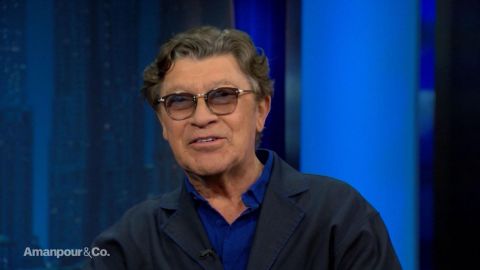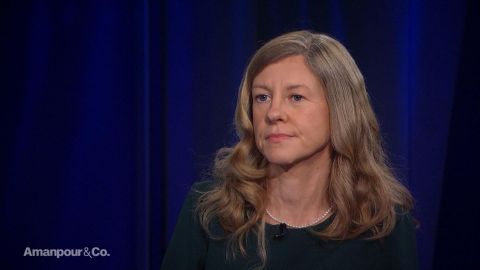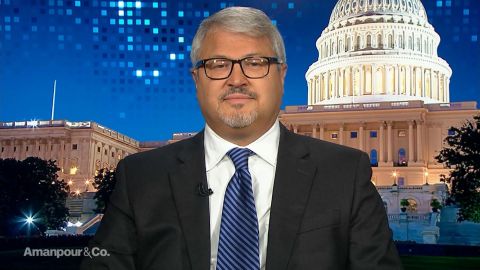Read Transcript EXPAND
CHRISTIANE AMANPOUR: Now, let’s turn our attention back to the film “The Irishman,” but this time to it’s music. Rock legend Robbie Robertson has once again collaborated with Martin Scorsese to score his latest mob hit. Robertson has also just released a solo album and starred in a new documentary based on the memoir of his time in the band. He gave a glimpse of his early days in music to our Walter Isaacson.
(BEGIN VIDEO TAPE)
WALTER ISAACSON: Robbie, thanks for being here.
ROBBIE ROBERTSON, CANADIAN MUSICIAN: Thank you.
ISAACSON: So cinematic, this is very personal. I mean, you’ve been there in all the great moments of rock in some ways, Big Pink, The Basement Tapes, Dylan gone electric. And now you do an album that just come out that’s deeply personal. Explain what was that about.
ROBERTSON: There was a lot of things going on while I was making this record, that — that all these connections were being made. They were making this documentary, “Once Were Brothers,” and while they were making that I one day sat down to write a song, I never know where it’s going to go when I sit down, and this song came out that was reflective of the guys in the band and this brotherhood. So, I wrote this song and the people making the movie said, oh my God, this is exactly where we’re going with this film. And then ended up calling the film, “Once Were Brothers,” and the song’s in there.
ISAACSON: Give me the opening lyrics of, “Once Were Brothers,” the song.
ROBERTSON: It’s when the lights go out and you can’t go on, you miss your brothers, but now they’re gone.
ISAACSON: There’s a wonderful scene in the documentary, in which you kind of introduce, in a way, each of your fellow band members. You’re up in Woodstock, you’re in a studio there in your house in Woodstock and everybody’s playing. Let’s show that clip and then maybe you can tell me about it.
(BEGIN VIDEO CLIP)
(MUSIC)
ROBERTSON: I think about Lee Vaughn, Richard, Rick and Garth all the time. We went through things together you could never replace, you could never give enough credit to something that special. I was an only child, so this brotherhood was so powerful.
(MUSIC)
(END VIDEO CLIP)
ROBERTSON: Amazing.
ISAACSON: It was so intense, why did it go so sour for a while?
ROBERTSON: I joined up with Lee Vaughn when I was 16-years-old in 1960, then over the next couple of years the rest of the guys that became the band joined up with us. Then in the end of ’65 we hooked up with Bob Dylan, ’66 we did this world tour with him, where they booed us everywhere that we played around the world. That was a unique experience.
ISAACSON: But, that’s because he went electric.
ROBERTSON: Right.
ISAACSON: That’s why they were booing.
ROBERTSON: Yes.
ISAACSON: What was it like when they started saying Judas, Judas, as if he’s betraying rock?
ROBERTSON: I’ve never heard of anything like this, Walter, that people play around the world and they boo you every night, and on some level it’s very successful. It goes on to become part of a musical revolution. It changes the course of music forever and years later when we play together again, everybody celebrated it like it was — like it was always terrific, but we knew the difference. So anyway, after that, and the band, we made these albums and they had a tremendous effect on the course of music, on the culture, on all kinds of things. But in this era, in this period there was a lot of experimenting going on with drugs. People were like, ooh, did you try this one yet? And in the beginning there was something that didn’t seem that dangerous about it. As time went on we started to be introduced to something that we were really unfamiliar with. And it’s called addiction and alcoholism. And so as this starts to seep in it has a big effect on the brotherhood. It has a big effect on the music. And we didn’t know how to handle it. You know, with some guys we’d be like hey man you’re drinking too much. Snap out of it. And that didn’t work. I came to the conclusion that we weren’t going to put a band-aid on this and fix it. So I said let’s do the last waltz. Let’s bring this amazing journey that we’ve had to a beautiful conclusion in the name of music. And the idea was then we bought our self a ticket to take a breather. Take a break. Everybody could go, some of the guys wanted to make solo albums, try this, do this. Then we were going to come back together and do something. This was my dream. We would do something creative and as good as anything we’d ever done before. And what happened was after a period of time nobody came back.
ISAACSON: But some of the members do come back a little bit later and you decide not to be a part of it. Right?
ROBERTSON: They – they asked me if I wanted to come and play some jobs with them. Because some time went by and they asked, they said we want to go play some jobs and is it Okay if we go out and call ourselves The Band? And I said absolutely. I would never get in the way. But it was really a matter of people just need – you need to make a living, right. And, but, I still had this thing that I was concerned about the well being of certain guys in the group.
ISAACSON: Let’s talk about Levon Helm, because one of the things in the documentary is watching y’all as teenagers. Almost like – really like brothers. And how close you were to him. Explain that early relationship and the intensity.
ROBERTSON: Well when I, when Ronnie Hawkins hired me, I went from Canada down to the Mississippi Delta, down to Helena, Arkansas and this was for me going to the fountainhead of Rock and Roll. This is where this music grew out of the ground. So it was like mythology to me coming from Canada. So I get down there and I realize I’m too inexperienced in life and I’m not good enough guitar player to take over lead guitar in this band yet. I have to overcome this and I did. And I did it with the help of Levon Helm. He saw it, I got something, I’ve got a certain talent and he befriended me and Levon and I really became very close friends and we were forever. You know just forever up until we did the Last Walls and then after that when everybody went in different directions I didn’t see him as much. And he was off he wanted to do his own thing. And I missed him terribly.
ISAACSON: Do you think you feel you’ve got it, you’ve got it resolved in your own head the falling out and then the resolution at the end?
ROBERTSON: I never, I never had a falling out on my side of it. Levon went to a place and he hit some hard times. And in those hard times he – he was thinking about what went wrong and he blamed me for it. And — and I knew him so well, I knew him so well that I was like that’s Levon he’s, he’s got these issues. Everybody knows what happened. He saw it from one way. I saw it from another. And I loved him and that’s it, end of story. I don’t have a part in whatever the issue was.
ISAACSON: You had interesting childhood. Your mother was from a — Indian reservation. I think she was Cayuga as well as Mohawk?
ROBERTSON: Yes.
ISAACSON: Right?
ROBERTSON: Yes.
ISAACSON: And you had an abusive father you grew up with.
ROBERTSON: Yes.
ISAACSON: And then, at one point, your mother tells you a story.
ROBERTSON: When I was like 13-years-old, because Robertson, my father, he had been abusive to my mother and to me, and she said, that’s it, I’m done. We’re going. And then one day she said to me, you know, I should have probably brought this up to you before. But he’s not your father. And I was like, what?
ISAACSON: Yes.
ROBERTSON: What do you mean, he’s not my father? I grew up — this guy was my father, right? Jim Robertson. And so, she ended up introducing me to the relatives of my blood father, and they were wonderful people.
ISAACSON: But, you father had been killed?
ROBERTSON: My blood father —
ISAACSON: Blood father?
ROBERTSON: — was killed before I was born. So, I didn’t know anything about this until then. And my relatives would tell me great stories about him. His — what his thing was, he had a phenomenal memory and he was card counter before people knew what a card counter was. And he gambled and he did — he was very successful. Then my uncle is like a major underworld figure, and it — when you’re young, you think, whoa, that’s kind of cool.
ISAACSON: So, it helped shape you?
ROBERTSON: All this stuff. In the documentary I say to them, you know, but you know I’m really, really drawn to music and that’s a direction I want to go in. They’re like, what are you talking about? Music? You know, you should be in the business with us. And my other uncle was like, yes, you don’t want to be in furs and diamonds? What’s the matter? And then the light went on, and they went, you mean show business?
ISAACSON: Yes.
ROBERTSON: Oh — oh, oh OK. OK, we understand that.
ISAACSON: This whole album seems to have a lot of strands of your life in it, as does the documentary that you did with it. How does that connect what you and Scorsese did with this new movie coming out on “The Irishman?”
ROBERTSON: When we did the “Last Waltz” we became really good friends and he would turn me on to amazing movies that I would have never seen. And I was turning him onto some music that he may have never heard. So, we had this interchange. Then, he’s directing “Raging Bull” and he says, I’d like you to help me out with the music on this. And he asked me to do the source music for the movie, and then there was songs that I had turned him onto that ended up in the movie as well. So, after I did “Raging Bull” with him, I was hooked. So, we’ve been doing this over all these years. The new one is “The Irishman.” The score that I did for this movie is something like I’ve never done before, and I’ve worked on I don’t even remember how many of these movies now.
ISAACSON: So, why is the score unlike anything you’ve ever worked on before?
ROBERTSON: Because, it takes place over many decades, this story. And I needed to find something that didn’t sound like, oh, that’s the 1950s, oh that’s the 1980s. That it could play and it had a timeless quality to it. And then I said to Marty, I think I’m on to it. And he said, oh, that’s good — that’s good. As long as it doesn’t sound like movie music. And not that he has anything against traditional film music or me, but he says, I just don’t know how to do that. I don’t know how to do the ba-ba- ba-da dome. You know the things. I — you know, it’s just — it doesn’t work with what I do. And I get that. I understand that. So, that’s why we’ve been doing this together all these years, and hopefully forever.
ISAACSON: So, you take one of the greatest songs you ever wrote for the band, “The Wait,” and you make it new again, like going around the world. And there’s a wonderful video.
(BEGIN VIDEO CLIP)
(MUSIC PLAYING)
MARCUS KING, MUSICIAN: Pulled into Nazareth, I was feeling about half past dead. Just need some.
ROBERTSON: (Voice over) My son Sebastian produced that. It was his idea and so he told me, he said you know what I’d like to do? I’d like to do one of these playing for change. It’s a thing that they have done before with other songs and they’re very impressive. He said but I want to do one with “The Weight.” And so, you know, I need you to participate in this and everything so I was like, he’s my son, of course, whatever you want to do.
(END VIDEO CLIP)
So anyway, we do it and then Ringo Starr comes in and he’s part of it and he plays on it and then what this playing for change this is, they have musicians, extraordinary musicians from all across the world playing together in wherever they are whether they’re in India, whether they’re in Tokyo. everywhere. Everybody joins together in playing this song and the video turned out to be a phenomena.
ISAACSON: One of the things I learned both from the documentary, and, of course, your memoir is about “The Weight” and Nazareth and why it begins that way.
ROBERTSON: I was in a mode when we were about to make music from big pink. I had been reading a lot of screen plays that I found that you could buy at Gotham Book Mart on 47th Street in New York and I had been reading some Boone Well screenplays and he had a theme that came to the surface in some of his stories that was kind of about the impossibility of being of sainthood, of being really righteous. You try to be too righteous, it’ll turn on you. Right? And he does it with a certain humor and a certain surrealism. He’s a king of surrealism. So anyway, I was sitting at my house in Woodstock and thought, God, I want to write a song and I just — sometimes you need something to spark the beginning of it and I was sitting there with my Martin guitar and I looked inside and it says Nazareth. These guitars are made in Nazareth, Pennsylvania. Right? That was the headquarters of Martin Guitars and I thought Nazareth. I like the sound of that and I thought I pulled into Nazareth, and that was.
ISAACSON: Keep going. Keep going.
ROBERTSON: And that was — feeling like half past dead and that was the beginning of this thing that was reflective of Mary and Joseph and no room at the inn and going to this place and there for somebody saying when you get there, say hello to Joe for me. When you get there, go and visit bla, bla, bla. And the story of these things and it turns into a crazy fiasco in the story and it was like a little movie, this song. So anyway, it connected to Boone Well thing. It connected to everything going on and it was reflective of when I first went from Canada down to the Mississippi delta and the south watched over me and it was like oh! Just the sound of the Mississippi River going by, the way people walk in rhythm here, everything these characters, all of these things kind of came out of the darkness for me and I incorporated some of that in the song.
ISAACSON: It wasn’t that big of a song when it came out and now it’s become one of the great songs of the century.
ROBERTSON: An anthem, yes.
ISAACSON: An anthem. Why is that?
ROBERTSON: You know, some things do have a timeless quality to them. And I always — because of the music that the other guys in the band we deeply appreciated was music that you just could feel inside. That’s going to be around. That is classic. And so in writing songs, I never wanted to write anything that felt trendy or happening or anything. I wanted to go to another dimension and write things that just came from a whole other place.
ISAACSON: Well you helped invent Americana Music. What do you think your legacy is going to be?
ROBERTSON: I don’t know someone else is going to have to figure out the legacy.
(LAUGHTER)
ROBERTSON: Part. I’m just going to try to give them something good to talk about.
ISAACSON: And a good soundtrack to listen to. Good to see you.
ROBERTSON: It’s so great, Walter. Thank you so much.
ISAACSON: Thank you, Robbie.
About This Episode EXPAND
Jack Goldsmith, former head of the Office of Legal Counsel under President George W. Bush, discusses the limits of executive power with Christiane Amanpour. Katharine Gun explains how she exposed a plot by U.S. security officials to spy on United Nations members in 2003. Former lead guitarist of The Band Robbie Robertson takes Walter Isaacson behind the scenes of his legendary rock career.
LEARN MORE


